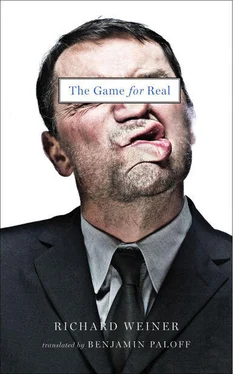“I’ll explain it to you. One day we’re sitting — Andrew, Paul, John, Peter, and I, you know we’re like brothers, which is to say we’re predestined for each other — a quintipartite singularity. We’re sitting one day, it’s getting dark; we blend, so that we’ve already lost the sense of physical distinctness; that’s how it falls when the gloved hand of evening holds the reigns, as it were, of five minds running together; we were quiet for a long time, and in the silence there slowly hatched the thing we’d all been thinking of; I had a good sense that it had to be christened, and I knew its name: The Story of Giggles’s Eyes. I started The Story of Giggles’s Eyes; we got into a rhythm; they kept me going, God knows how, maybe by the way the others stretched, the way they shifted in their seats. When I got to the words ‘I can’t live without you,’ to me they sounded not like they were mine, but rather as if Giggles was saying them, and saying them as if she were pronouncing sentence on herself.
“‘I can’t live without you’: banal words, you hear them a hundred times a day, but you know how it is with banalities, a hundred times they’re nothing, the hundred-and-first will open up suddenly, God knows why, and they’re full of meaning. — Was it the light, or something else? In short, barely had I said ‘I can’t live without you’—we were sitting in a circle — than we caught each other’s gazes; our gazes locked at a single point, and so precisely that it made a spark. — We were a circle, and its center was a spark. Was it perhaps our collective thought? If it was a collective thought, we belonged to it, not it to us. We didn’t make a peep, not then, not any time before, not after. Was it this quintipartite thought that had popped out and made the spark? The center was shining brighter than ideas usually gleam. Was it something else, then? What?”
Fuld: What? (And a jousting of thousands of words rushed into that “What?” and shattered within it.)
Mutig: Hold on. That’s not what’s important. — Andrew was playing with this puppet. This one here. Do you see it? (Mutig lifted it and showed it around.) He sat it prettily on his knees, and just like that: he plucked out its eyes. God knows where he got the nail from.
“It’s blind,” he said.
Mutig leaped up: “Giggles, now what are you doing?”
Which is to say that Giggles had shouted “Jettatura” and toppled over again.
“So then why did you promise that you’d be smart, Giggles? What kind of way is that to behave? As if you’d been listening in the first place. Party-pooper! As if you haven’t known all along that nothing is going to change.”
Giggles now resembled a doll so perfectly that I really couldn’t tell. . Mutig grabbed her — she was as though in two pieces, and sagged across his arm — he sat at the table with her and caressed her.
“I’ll keep you on my lap. Just like at home, when we have our little doll lessons: what does the cross over the mouth mean? what does the dimple in the little forehead mean? etc.”
The Negro was caressing her from the other side. Giggles was tearing up, and she said, “I’m not blind. I see you just fine.” (Giggles was tearing up, yet there were no tears in her voice.)
“But you don’t perceive,” Mutig added gently.
“Oh, I know, I know.”
Mutig continued, “That’s all there was from Andrew, ‘She’ll go blind,’ he plucked out her eyes and passed her to Paul. ‘She’ll go dumb,’ Paul said — the cross over the lips — and passed her to John. ‘She won’t figure things out,’ said John— the dimple in her brow — and ‘she won’t stumble upon things,’ Peter added, slashing the ever-so-beautifully-curved shoulders beneath her little head.”
Mutig adjusted Giggles comfortably on his knees with the lovingly worn-out motion of mothers whose laps have fallen asleep beneath their tike. For a moment he seemed to be looking for something, after which he turned, half-jokingly, half-imploringly, to the blackamoor. “How about we just show him?”
The blackamoor puffed out his chest and bared his teeth. It was a broad, strapping chest, a real cabinet, something like a wire manger that the flame of an oil lamp had given a blondish cast. A canvas banner from edge to edge, and in big letters: GIGGLES: BEGONE. This stage was so exceedingly “like it was real” that it was poking fun at reality. Never before have I seen a more dastardly caricature: imitating slavishly, it exaggerated. The stage cynically represented a sincere salon. In the foreground, on the tall cushion of a pouf, sat Giggles. She was looking in such a way that one glance would tell you she was calling for heavenly aid. She was making an effort at the casual and fetching smiles that bloomed so naturally on the carmine lips of dames who know how to pass by. (For there were a lot of dames in there.) But the smiles she attempted were falling into her lap like tears. She kept producing more and more; they didn’t want to hold. The salon was bustling. The men were standing in groups and debating. There were clean-shaven youths with lacquered hair, their fresh faces betraying what they would be when the time came for their beards to sprout; and there were bearded men with disheveled coifs whose whole dignity lay in their self-righteous whiskers. They all hated each other; thus they all agreed. The dames, with that casual and fetching smile, passed from group to group and stopped briefly at each. They’d stop, their gazes wandering somewhere where they could not see, and having thus trespassed they’d walk away; promises of assignations remained after them, and the group was momentarily enfrothed and without airs; soon, however, the brows furrowed again, the furrows converged into clouds, and the men hated each other again, a bit more grimly, agreeing still more harmoniously than before. — Across from Giggles sat Paul. Giggles was reasoning with him insistently. The talk was flowing, but it wasn’t making a dent on Paul. He walked it dry-shod, like the Jews through the Red Sea. Giggles knew it; Giggles didn’t want to know it. Still, once she’d managed to penetrate Paul’s eyes, she hunted for a place where she could drop anchor, and there she posed some anxious question. But the eyes were not listening. Paul turned to the redhead beside him and spoke with her quite respectfully; behind this respect there cowered an old tryst. Again, Giggles started to speak. Now, Paul didn’t let her out of his sight. His affable smile hissed like a spiteful verdict. Giggles finished her question even more timidly than she’d started. Paul took this question cautiously, but he didn’t answer. He carried it to the redhead next to him; he reshaped Giggles’s anxiety into a gallant ritornello and placed it at his neighbor’s feet. She promised him something with a long look, and Paul returned to Giggles. He returned with an inquisitive look that placed too much emphasis on the lie that his attention and engagement had not wavered, not for a moment. Giggles went on, urging him still, and finished with her hand resting timidly on Paul’s shoulder. Paul endured Giggles’s gaze for a long time. Now — now it seemed he would answer her amiably, but here, with a phosphorescent jibe, he let slip that his was the gaze of an executioner. His eyes, looking somewhere toward Giggles’s horror, were chanting that Giggles saw nothing at all, that Giggles heard nothing at all. Then Paul gently freed himself from Giggles’s hand, rose, and moved away. It was like a tragicomic caricature of a fair judge— lo that he leaves with heart asunder — that his higher sort of fairness always prohibited him from heeding the distress of the condemned man writhing at his feet.
“Because she’d let herself go, because she was staring so,” Mutig stressed mournfully, and the palm of his hand slid down the blackamoor’s chest, in which things went dark. But he immediately brought up the lights again.
Читать дальше












